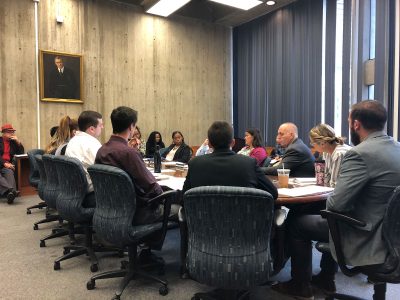
By Natalie Patrick and Kylie Tomasiak
As the opioid crisis persists in Massachusetts, local leaders at City Hall are calling on the state legislature to help alleviate Boston of the immense pressure of handling this epidemic on their own.
A City Council committee meeting Monday focused on the topics of homelessness, mental health and recovery. There, community leaders shared their sentiments on how a personal and hands-on approach is necessary to implement real change in the treatment of addiction patients.
City Councilor At-Large Annissa Essaibi-George led the meeting, placing emphasis on the impact of the opioid crisis in the Greater Boston area — an impact, she said, felt not only by those with active addiction issues, but also by their families, friends and the larger Boston community.
Since Boston has a history of helping the homeless population, District 2 City Councilor Ed Flynn said it was important for the Commonwealth to aid Boston in maintaining these efforts. Flynn offered his advice, as a former probation officer at Suffolk Superior Courthouse who worked extensively with those at-risk.
“The crisis here in Boston is really a crisis throughout the state, and I think it’s an opportunity and an obligation for the state government also to play a key role in financing a lot of the ongoing problems in Boston as well,” Flynn said in an interview after the meeting.
The city has recently been pressured to take in the hundreds of citizens evacuated from Long Island, Essaibi-George said in the meeting. Due to the unsafe conditions of the Long Island bridge, in 2014, Boston Mayor Martin Walsh called for the evacuation of all those living on the island, where the only large housing center for the homeless was located in Massachusetts.
The City has been tasked with finding short-term solutions for the influx of citizens who need help with employment and are recovering from addiction and other health problems, Essaibi-George said in the meeting. To accomplish this, some council members suggested a more direct approach in aiding those struggling.
Essaibi-George proposed in the meeting that providing first-hand welfare to those in crisis could come in the form of “walking sessions,” which would consist of local officials walking with relief leaders through concentrated areas of crisis. These sessions would also provide perspective for policy makers to see firsthand how their policies are playing out, she said.
“When we are here at City Hall or in the State House, it might look really good on paper,” Essaibi-George told The Daily Free Press after the meeting, “but if we don’t go see it in practice and recognize any of the pitfalls that have been designed into a policy, we can’t improve it.”
The council also agreed that members of the City government should be well-versed in responding to the increasing number of overdose incidents, which could mean requiring officials to be trained in administering Narcan, a drug used to counteract opioid overdoses.
Some council members, like District 5 City Councilor Tim McCarthy, said public facility employees around Massachusetts are already using their knowledge to go above and beyond in identifying signs of an overdosed individual.
“Librarians are under the gun,” McCarthy said in the meeting, “and it’s not even in their job description.”
The council decided it was necessary to look beyond the sigmas that surround the opioid crisis to find productive solutions.
“It is a widespread consensus that addiction is a disease,” Essaibi-George said after the meeting. “Yet, there are still some very specific barriers that are man-made to being treated as if you have a chronic illness.”
This is an account occasionally used by the Daily Free Press editors for posts with multiple authors or otherwise for special circumstance publications. See authorship info on the byline at the top of the page.





Hard hitting, insightful article.